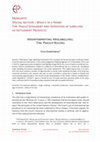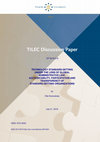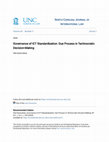Papers by Olia Kanevskaia
Edward Elgar Publishing Limited eBooks, Jul 28, 2024
Edward Elgar Publishing Limited eBooks, Jul 28, 2024
Edward Elgar Publishing eBooks, Dec 4, 2023
Edward Elgar Publishing eBooks, Dec 30, 2021
Social Science Research Network, 2019
On 13 June 2019, Advocate General Hogan issued his opinion on Case C-363/18 Organisation juive eu... more On 13 June 2019, Advocate General Hogan issued his opinion on Case C-363/18 Organisation juive européenne, Vignoble Psagot Ltd v Ministre de l'Economie et des Finances, currently pending with the Court of Justice. In this case, referred by the Conseil d'État, the Court was invited to rule whether EU law requires for products originating in a territory occupied by Israel since 1967 ("Israeli settlements"), an indication that the product comes from that territory. While this question was answered affirmatively by the Advocate General, it remains unclear if the Court's forthcoming decision, whether or not it will follow Mr. Hogan's opinion, will have consequences on EU trade policy for occupied, disputed or annexed territories other than Israeli settlements.
Research Policy, Nov 1, 2023

European Papers - A Journal on Law and Integration, Mar 14, 2020
Mandatory origin labelling of products from occupied territories has been a delicate matter in th... more Mandatory origin labelling of products from occupied territories has been a delicate matter in the EU external trade policy. In the recent judgement Psagot (judgment of 12 November 2019, case C-363/18, Organisation juive européenne and Vignoble Psagot [GC]), the Court of Justice considered consumers' ethical considerations related to violations of international law as a reason for mandatory origin labelling of products originating in the Israeli settlements. This Insight argues that, in its decision, the Court missed a number of opportunities to clarify some essential concepts of EU food law, consumer protection and customs law and, as such, provided a ruling that is based on flawed and unconvincing argumentation. The Court's broad interpretation of the notion "ethical considerations" under Regulation 1169/2011 opens a Pandora's box of trade-restrictive practices while at the same time, continues the EU inconsistent policy towards trade with occupied territories. KEYWORDS: EU external relations-origin marking-consumer protection-food information-average consumer-ethics in EU law.

Social Science Research Network, 2016
The role of transnational non-governmental bodies in international standardization has often been... more The role of transnational non-governmental bodies in international standardization has often been in the limelight of recent academic discussions. While standards developed by Standard-Setting Organizations (SSOs) are typically non-binding, they can nevertheless acquire an obligatory character, either by virtue of the force given to them by domestic regulation or another organization such as the WTO or by obtaining significant market power. Such metamorphosed standards, especially when developed in hybrid or private fora, are frequently accused of lacking legitimacy and accountability. In particular, these concerns are relevant for the technology sector, characterized by expertise-driven decision-making and the symbiosis of public and private stakeholders. This paper sheds light on the mechanics of technical standard-setting by analyzing the working procedures of the public, hybrid and private SSOs leading in telecommunications and ICT standardization, namely the International Telecommunications Union (ITU), the European Telecommunications Standards Institute (ETSI) and the Institute of Electrical and Electronics Engineers (IEEE). It further suggests that despite the fundamental difference in the institutional nature of their forums, standards formulated by all three organizations constitute a collective action and fall within the scope of global administrative law. Ultimately, this paper attempts to reveal the principles, which could serve as administrative tools for scrutinizing the indirect powers of the SSOs, and to provide a preliminary comparative assessment of the examined procedures with regard to the identified principles.
Social Science Research Network, 2019
Baron and two anonymous reviewers at the EURAS conference for their insightful comments. For its ... more Baron and two anonymous reviewers at the EURAS conference for their insightful comments. For its research on competition, standardization, and innovation, TILEC has received funding from Qualcomm Inc., which is gratefully acknowledged. The research on which this article is based was conducted in accordance with the rules set out in the Royal Dutch Academy of Sciences (KNAW) Declaration of Scientific Independence.
Cambridge University Press eBooks, Aug 31, 2023

Journal of International Economic Law, May 10, 2023
The legality of trade with territories over which sovereignty is disputed has recently come to th... more The legality of trade with territories over which sovereignty is disputed has recently come to the forefront of policy and academic discussions due to emerging case law and escalating territorial conflicts. While considerations shaping the debate on economic activities with disputed territories are typically informed by concerns of international law, little is known about international trade and customs rules applicable to these regimes. This article aims to fill this literature gap by inquiring into the rules that apply to trade with disputed territories under the relevant World Trade Organization (WTO) Agreements, in particular the General Agreement on Tariffs and Trade, the Agreement on Rules of Origin, and the Agreement on Technical Barriers to Trade. In a broader sense, it contributes to the understanding of interactions between the WTO and other self-containing regimes of international law, illustrating the challenges that arise from their different approaches to territories.

Journal of World Trade, May 1, 2022
Standardization of information and communication technologies (ICT) has become essential for the ... more Standardization of information and communication technologies (ICT) has become essential for the global economic activity. ICT standards provide for coordination between devices, interfaces, and networks; they support technical infrastructure, bolster e-commerce and rule digital markets. ICT standards also have a profound effect on global trade regulation since they serve both as enablers and barriers for transboundary commercial transactions. Because ICT standards are generally produced by the private sector, their trade-restrictive effects have so far largely managed to escape the purview of the World Trade Organization (WTO). However, due to their growing normative consequences, the status quo of ICT standards and ICT standards bodies in multilateral trade cannot be maintained any longer. This Article argues that the WTO has powerful tools to address trade-restrictive effects of ICT standards, at the very least by giving a normative account to institutional characteristics of ICT standards bodies, but that these tools are not effectively used by Members. Conversely, the current application of the Technical Barriers to Trade (TBT) instruments privileges powerful economic actors, expanding the gap between the developed and developing countries. A new, rule-based approach is required to re-establish the WTO's relevance in standard setting and address power imbalances brought by technological convergence.

On 13 June 2019, Advocate General Hogan issued his opinion on Case C-363/18 Organisation juive eu... more On 13 June 2019, Advocate General Hogan issued his opinion on Case C-363/18 Organisation juive europeenne, Vignoble Psagot Ltd v Ministre de l'Economie et des Finances, currently pending with the Court of Justice. In this case, referred by the Conseil d’Etat, the Court was invited to rule whether EU law requires for products originating in a territory occupied by Israel since 1967 (“Israeli settlements”), an indication that the product comes from that territory. While this question was answered affirmatively by the Advocate General, it remains unclear if the Court’s forthcoming decision, whether or not it will follow Mr. Hogan’s opinion, will have consequences on EU trade policy for occupied, disputed or annexed territories other than Israeli settlements. This paper aims to review TBT measures adopted by the EU against the territories whose military and economic occupation was openly condemned by international arena. By examining the EU’s trade agreements with States that claim sovereignty over the disputed territories, it reveals which rules of origin apply to products imported into the EU from the Israeli settlements, Turkish Republic of Northern Cyprus, Western Sahara and Crimea. In particular, this paper focuses on conditions that exporters have to fulfil to bring their product into the EU under preferential trading rules. The findings suggest that the EU lacks coherence both in its policy and practice towards trade with disputed territories, which in turn undermines the effectiveness of its measures and weakens the EU’s position in international arena.

CSR, sustainability, ethics & governance, Sep 28, 2019
In the modern world of rapid and continuous industrial development, standardization plays a consi... more In the modern world of rapid and continuous industrial development, standardization plays a considerable role in shaping the global economy. Standards establish quality benchmarks, resolve connectivity problems, fuel innovation and by these means, enable technological advancement and facilitate international commerce. Standards come in a bewildering variety of forms and types and affect various areas of activities, often causing misunderstandings between, inter alia, engineers, economists and lawyers. Although currently ignored, such cross-sectoral misapprehensions may negatively impact standardization in the long run. In this regard, a relevant point to consider is the intertwining of different sectors and activities in the wake of growing digitalization. To grapple with the technical and regulatory challenges arising from this industry shift, an increased understanding of different standardization areas is required. Taking a legal perspective, this contribution describes experiences of incomprehension and misunderstanding when discussing various standardization issues with economists, software developers and mechanical engineers. It emphasizes the importance of cross-sectoral education on standardization for generating a constructive dialogue between different experts. The contribution concludes that increased awareness of various standardization domains enables experts to learn from each other and facilitates their cooperation within different sectors, pacing standardization to the needs of industry and society.

North Carolina Journal of International Law, May 31, 2019
In the world of continuous globalization, technical standards and industry norms play a crucial r... more In the world of continuous globalization, technical standards and industry norms play a crucial role in transnational economic development. For the past few decades, increased digitalization and emergence of new technologies gave due prominence to ICT standards: our future is closely linked to the Internet of Things and 5G technologies that are expected to penetrate an enormous range of economic sectors and therefore affect our quotidian life. At the same time, the introduction of these new technologies is accompanied by concerns such as privacy and security. In particular, security has been subjected to a wider political debate recently, largely fueled by national security concerns voiced by Western governments regarding the involvement of China-based companies in the standardization of 5G technologies. In this context, this paper discusses whether the current regulatory landscape can address the variety of concerns raised in relation to the development of ICT standards through well-established procedural principles for standard-setting, such as openness, transparency, and consensus, and whether these principles ensure that ICT standardization remains balanced and inclusive, while delivering cutting-edge technological solutions.
Edward Elgar Publishing eBooks, Nov 1, 2017

Uploads
Papers by Olia Kanevskaia